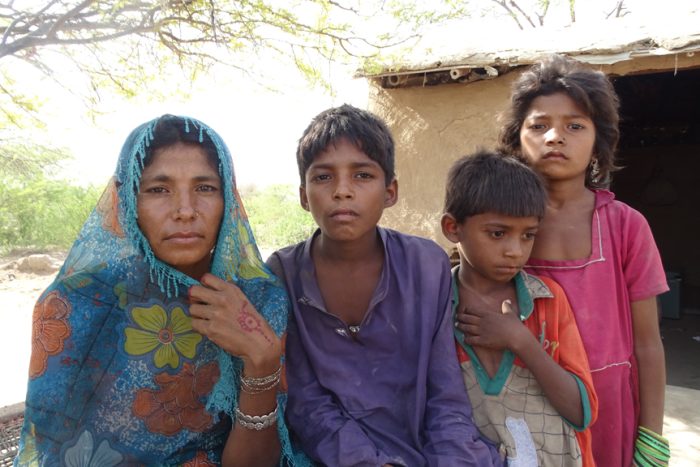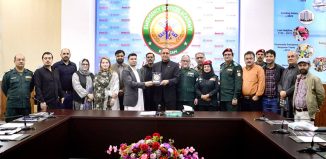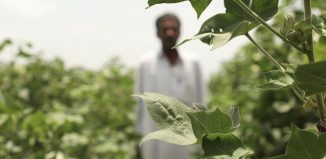Shelter, Wheat, and Hope: How Lakshmi Invested in Her Family’s Future
Married at the age of 17, Lakshmi assumed the weight of household responsibilities early in life. With her husband, Laalu, working as a labourer in the city to support the family, Lakshmi remained the steady anchor at home. Together, they raised four young children, three sons and a daughter, all between the ages of five and ten. Despite limited resources and daily challenges, Lakshmi nurtured a modest but fulfilling life, grounded in resilience and the warmth of her family.
Five years ago, Lakshmi’s world was turned upside down when her husband, Laalu, tragically passed away after a snake bite. Fate did not give her a chance to fully grieve the loss of her partner. Overnight, she became the sole caregiver and breadwinner for their young children, forced to navigate an uncertain and demanding future entirely on her own.
Now 32, Lakshmi continues to shoulder the full responsibility of raising her family. To survive, she and her children work together as labourers in fields of Village Lakho Kolhi, striving each day to meet their most basic needs.
In 2021, driven by quiet determination, Lakshmi took a bold step to improve her family’s future by breeding two goats, establishing a modest but stable source of income. It was a turning point that promised a path toward self-reliance. However, less than a year later, the catastrophic floods of 2022 swept across Pakistan, displacing thousands and claiming countless lives and livestock.
Lachmi’s village, Lakho Kolhi in Umerkot, was among the hardest hit. The deluge reduced homes to rubble and left the community submerged in devastation, erasing what little security they had built. Lakshmi and her family lost their most treasured possession, their home, and faced a heartbreaking reality. The destruction was so extensive that rebuilding was impossible. With no other option, they were forced to flee and start over, carrying with them only resilience and the will to endure.
With nowhere to go, Lachmi and her children found themselves in her brother-in-law’s house, who himself had relocated to village Anwar Pathan with his family in search of safer grounds. In a time when everyone around them was grappling with uncertainty and hardship, his support was both rare and deeply meaningful. Within that borrowed shelter, Lakshmi tried to rebuild a sense of home for her children, even as daily survival weighed heavily on her mind. The question of how to feed her family was a constant worry, one that echoed the broader struggle shared by countless families, especially single mothers, facing the aftermath of displacement.
Living in someone else’s home brought a host of challenges for Lachmi, from compromised dignity to concerns over safety and protection. She endured mistreatment and a lack of respect from the household members, all while carrying the weight of worry for her children’s well-being.
In the aftermath of the devastating floods, Community World Service Asia (CWSA), in partnership with Presbyterian World Service & Development (PWS&D) and the Canadian Food grains Bank (CFGB), launched a Cash for Food initiative aimed at restoring dignity and choice to families like Lakshmi’s. The program provided unconditional cash assistance of PKR 20,000 per month for three months, March, May, and June 2025, empowering flood-affected households to address their food security based on their specific needs.
With the first installment, Lachmi prioritised her family’s stability. She spent PKR 10,000 (USD 35) to buy wheat flour, to ensure a reliable supply of food in the weeks ahead. Another PKR 6,000 (USD 21) went toward repaying a debt she had incurred just to feed her children, a financial weight she had long carried. The remaining PKR 4,000 ( USD 14), was carefully allocated to purchasing sugar, rice, and vegetables, allowing her to provide balanced nutrition with renewed peace of mind. In a move that reflected both vision and resilience, Lakshmi used the second installment to purchase two young goats, an investment in future sustainability. As the goats grow, she plans to sell their milk locally, establishing a modest yet dependable source of income for her household..
With the third and final cash installment, Lakshmi embraced a moment of joy amidst hardship. She lovingly chose new clothes for her children, spending nearly PKR 5,000 ( USD 18) on new clothes for them to bring smiles and a sense of normalcy to their lives. The remaining PKR 15,000 (USD 53) was set aside to secure their food supply, a deliberate decision rooted in maternal foresight. “Even if we have nothing else,” Lakshmi shared, “we should have wheat in the cabinets, so we never go to bed hungry.”
Lachmi has courageously shared her journey with others, inspiring many through her resilience and determination. “Now we’re finding new ways to support our families,” she said. “Many women in our village have stepped up to help, especially after losing their livelihoods.”
Part of the funds also went toward purchasing medicine for her seven-year-old Gulji, who lives with epilepsy. Reflecting on how she used the assistance, Lachmi said, “The aid is temporary, and the money is meant to end someday. To truly benefit from it, I had to invest it with purpose.”







